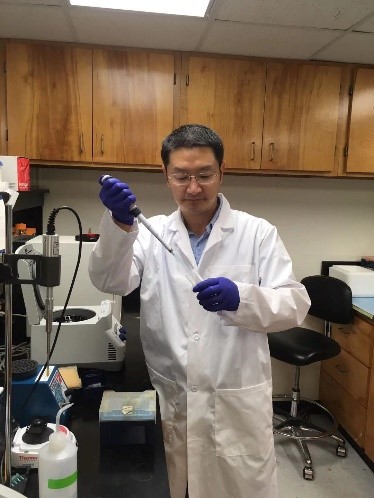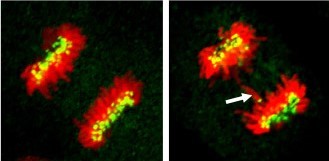
Credit: Courtesy of Dr. Hong Liu.
“A scientific career is really worth it,” says Hong Liu, Ph.D., an assistant professor of biochemistry and molecular biology at Tulane University School of Medicine in New Orleans, Louisiana. Check out the highlights of our interview with Dr. Liu below to learn about his journey as a scientist and his advice for students.
Q: What makes a career in science exciting?
A: I think there are at least two things that make a science career very exciting. The first is that doing science means you have freedom to explore a lot of new ideas. The second thing is it’s rewarding. The “rewarding” I’m talking about here is not like how much money you can make. It’s rewarding in the answers you find and the new knowledge you reveal.
Q: What was your path to becoming a scientist?
A: I became interested in science in a gradual way. When I was in college, I wasn’t so sure about what I wanted to do for the future. I got my bachelor’s degree in biochemistry at Sichuan University in China. After that, I did a 3-year master’s program in biochemistry and molecular biology. But when I was in my 20s, I wanted to be a businessman.
I also thought about becoming a medical doctor in my 30s; that’s the age when I was starting my Ph.D. I think the turning point was the first 2 years of my Ph.D. study and especially my Ph.D. adviser at Florida State University. He set an example of how you can be a good and dedicated scientist. He also showed me how fascinating science itself is. That’s when I made a decision to pursue science as my career.
Q: What’s the focus of your lab?
A: My research mainly focuses on the mechanism of chromosome segregation. Every organism has genetic information, and the carrier for genetic information is called a chromosome. To pass genetic information from one generation to the next, you first need to duplicate your chromosomes. After the chromosomes duplicate, you need to segregate the duplicate chromosomes into daughter cells.

Our work right now is to focus on how the chromosomes segregate into each daughter cell. This is very critical. If something goes wrong in this process, the consequence is that you’ll lose some of your genetic information or you’ll get more genetic information. We say these cells have aneuploidy, which means the wrong number of chromosomes. More than 90 percent of cancer cells have aneuploidy. So, if you can understand the mechanism of proper chromosome segregation, you may figure out why the aneuploidy or chromosome mis-segregation occurs, and then based on that, you may find a potential therapy for cancer.
Q: What challenges have you faced in your career?
A: The biggest challenge, I think, is how to balance the time in work and in life. Because the thing is, doing science takes a lot of time. I remember when I was doing my postdoc training, I thought regular hours weren’t enough. At night I would usually go back to the lab to do some extra work. But this was kind of a conflict with a family life. I have kids, so I figured out a schedule where I would, for example, at 5 or 6 o’clock, go back home. I would have dinner with my family and play with my kids for an hour. Then at 8 o’clock, I would go back to the lab to do some benchwork.
Right now, I don’t go to the office at nighttime, but I do spend a half day of the weekend there—writing some papers and grants, or dealing with other issues. I’m always trying to balance the different duties and responsibilities.
Q: What advice do you have for students interested in pursuing a career in science?
A: You’re probably going to go back and forth mentally. You’ll probably have some struggles. But once you have a strong interest in science, once you think you can do something, go for it. I think one day, you’ll find out all your efforts will pay off.
Dr. Liu was a research project leader on the Tulane Centers of Biomedical Research Excellence grant P20GM103629 (principal investigator: S. Michal Jazwinski). His research is currently supported by NIGMS grants R01GM141123 and R01GM124018.

